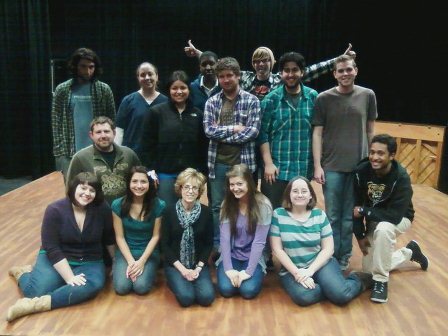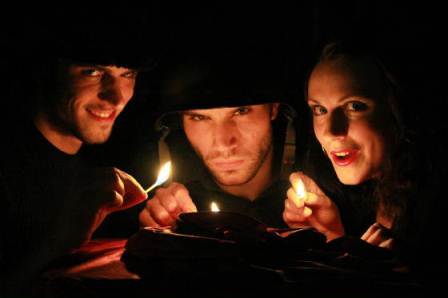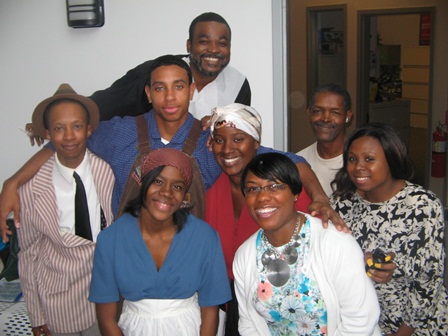by Gillian Ellis

“All those involved in interpreting a play – actors, directors, technicians and designers – need to be aware of how a play is constructed so that they can do a better job of bringing the playwright's intention to life.” So says
Kitty Dubin, who has taught playwriting at OU since 1997.
A successful playwright herself, with a longstanding relationship with “her theatre home” – the Jewish Ensemble Theatre Company – Kitty sought out now retired OU theatre professor
Michael Gillespie and convinced him of the potential benefits of such a class for all theatre students with arguments such as: “The more hats that theatre majors can wear the better” and “Realizing every line of dialogue is there for a reason and if you don't know what that reason is, you better try to figure it out.”
Kitty’s arguments were persuasive and the results of the class even more so. Today, theatre and English students can enroll in Playwriting I and Advanced Playwriting – the latter by instructor invitation only.
Over the years Kitty’s students have met with great success. To date 93 (and counting) of her students’ works have gone into production either on stage, at a festival or as a performed reading. She is justifiably proud of this. It reflects not just the quality of instruction in her classes, but her continuing commitment to her former students as a mentor.
She says, “I really try to move my students towards becoming professionals.” Drawing on a lifetime of experience pitching her own work she says, “I tell them when to push the send button and not to worry about being rejected. You have to know when it’s time to let the work go.”
Although Kitty almost always has some writing novices in her classes, she also often has students with some prior writing experience. Typical of these is
Lori Eaton, who says, “Before I took Playwriting I, I had never attempted to write a play before [although] I write both in my professional life and my creative work, producing everything from magazine articles to brochures to website content and even a short story or two. I took Playwriting I in the fall of 2008 and Playwriting II in the winter of 2009. That summer my first short play was produced at Boxfest Detroit. Since then I have had three other short plays produced in festivals. In addition, I wrote an original short play that was part of OU's Pageant Play last year.”
Lori continued, “Learning the craft of playwriting has informed all of my creative work. The structure of plays, the rising and falling action required to hold an audience, the focus on character and motivation are all important lessons that have helped me write plays that were well received by local theaters. I would encourage writers of any genre to study playwriting both to learn a new form, but also to strengthen all their creative work.”
Franco Vitella (B.A. Theatre ’09) had also written before. “I first took the class as an elective for my major in English. I was actually hoping to improve my dialogue writing for short stories, but ended up enamored with the class and the writing possibilities it created. I ended up switching my major to theatre.”

Franco found the way the class was run to be very supportive and conducive to creativity. “It is a very open atmosphere for your peers to offer their critique. I met some of my best friends in that class.”
Franco says, “Writing plays is hard. You'll think you have a brilliant idea and when you sit down to put it on paper, it doesn't always work out.” But Kitty’s classes have helped Franco find professional success. His play
Burn the Red Banner was produced this past February at The Abreact Performance Space in Detroit.
“Take the class!” he advises. “Actors: it will give you a greater appreciation for the source of where a play comes from and how much hard work an individual put in to give you something to do and say on stage. English majors: even if you have no interest in theatre, this class will improve your own writing, and open the door for other opportunities.”
Anetria Cole (B.A. Theatre ’09) agrees. “I would say to anyone who is serious about becoming a professional writer, ‘Take Kitty’s classes.’”
Before working with Kitty, Anetria wrote for years and even debuted her first play in 2005 to an opening night audience of 600 people who loved it. But she says, “I didn’t have a clue as to the various methods and mechanics involved in writing a good, solid script. Mrs. Dubin’s class took me to a whole different level of writing. [She] helped me to develop and fine tune my writing.”
It was in the Advanced Playwriting class that Anetria developed one of her 10-minute plays into her first professional full-length play,
Bronzeville Gold. She says, “The atmosphere of Playwriting I and II was perfect. Being around creative people from various backgrounds, cultures, and points of view, really helped me to become a well-rounded writer. We would listen to each other’s scripts every week and give very constructive criticism, which allowed us to really tighten up and correct our writing. Each rewrite that we did allowed us to have really well put together scripts by the end of the semester.”

That fine tuning comes late in the process. In Playwriting I Kitty teaches the basic elements of structure, character and dialogue. She talks about narrative, about beginnings, middles and endings, about inciting incidents, and tells her students that they can’t break the rules until they fully understand what they are. Kitty says, “Understanding the craft gives a playwright so much more confidence.”
Anetria Cole agrees. She says, “[The classes] help to hone your writing craft in such a way that you will never write the same. You will write with a focused and meaningful purpose. To this day before I write anything, I pull out my old notes from Kitty’s class and make sure that I am on the right track when I write.”
Photos:
Top: Kitty Dubin and the students of her playwriting class, April 2010.
Center: The cast of Burn the Red Banner
Bottom: Anetria Cole and the cast of Bronzeville Gold

 “All those involved in interpreting a play – actors, directors, technicians and designers – need to be aware of how a play is constructed so that they can do a better job of bringing the playwright's intention to life.” So says Kitty Dubin, who has taught playwriting at OU since 1997.
“All those involved in interpreting a play – actors, directors, technicians and designers – need to be aware of how a play is constructed so that they can do a better job of bringing the playwright's intention to life.” So says Kitty Dubin, who has taught playwriting at OU since 1997.  Franco found the way the class was run to be very supportive and conducive to creativity. “It is a very open atmosphere for your peers to offer their critique. I met some of my best friends in that class.”
Franco found the way the class was run to be very supportive and conducive to creativity. “It is a very open atmosphere for your peers to offer their critique. I met some of my best friends in that class.”